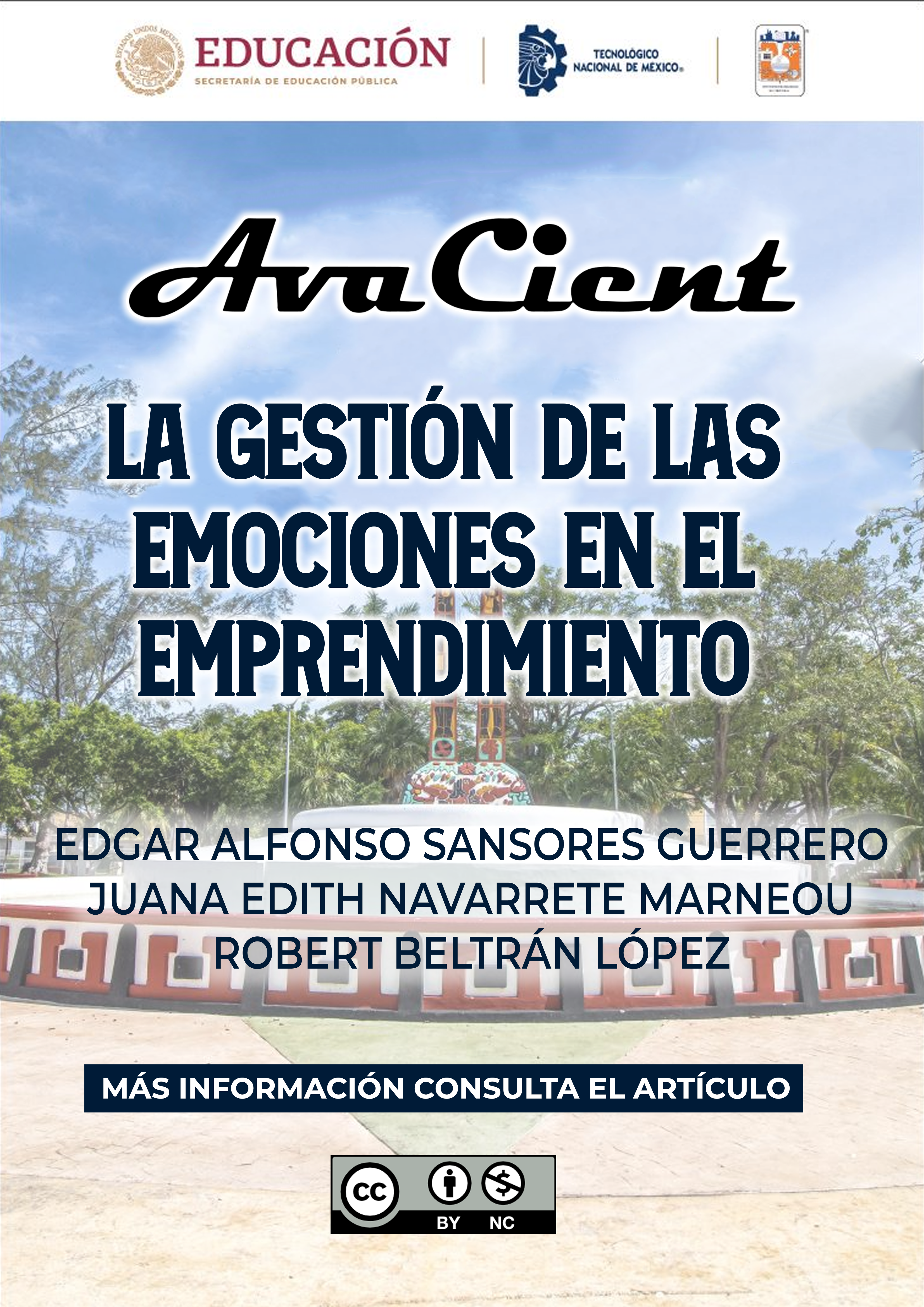LA GESTIÓN DE LAS EMOCIONES EN EL EMPRENDIMIENTO
Palabras clave:
Emprendimiento, gestión, emociones, decisionesResumen
La presente investigación tiene como objetivo determinar, desde la perspectiva administrativa, la relación entre la Inteligencia Emocional y el espíritu emprendedor en los municipios de Othón P. Blanco y Felipe Carrillo Puerto del Estado de Quintana Roo, México. De acuerdo a los estudios realizados sobre el tema, los principales autores citados son Goleman (1995), Mayer y Salovey (1995), Caruso y Salovey (2004), Goleman y Boyatzis (2017),Yıldırım, Trout y Hartzell (2019), y Bradberry y Greaves, (2009). La metodología utilizada es de tipo causal. Por ello, se utiliza como herramienta de análisis la regresión múltiple, la cual permite determinar dicha relación. Para la recolección de información, se aplicó un cuestionario estructurado a 223 propietarias de empresas, quienes fueron las informantes clave. Los resultados obtenidos muestran que existe una relación directa entre la decisión de emprender y la IEM de las mujeres, en sus cuatro dimensiones (autoevaluación, valoración de los demás, regulación y autogestión). Por tanto, se concluye que la IEM de las empresarias representa un adecuado indicador para explicar la decisión de emprender iniciativas de negocios.
Descargas
Citas
Awad, M. (2012). Emotional intelligence and entrepreneurial orientation. The moderating role of organizational climate and employees’ creativity. Journal of Research in Marketing and Entrepreneurship, Volumen 14, No. 1. Inglaterra (Pp. 115-136).
Basha, S. (2019). Emotional intelligence: the secret of successful. Journal of Emerging Technologies and Innovative Research, Volumen 6, No. 1. India (Pp.117-120).
Bradberry, T. y Greaves, J. (2009). Emotional intelligent II. Editorial Talent Smart: Estados Unidos de América.
Caruso, J. y Salovey, P. (2004). The emotionally intelligent manager: How to develop and use the four key emotional skills of leadership. Editorial John Wiley & Sons: Estados Unidos de América.
Cervantes, V. (2005). Interpretaciones del coeficiente Alpha de Cronbach. Avances de Medición, Volumen 3.
Colombia (Pp. 9-28).
Drucker, P. (2014). Innovation and entrepreneurship.Editorial Routledge: Estados Unidos de América. Goleman, D. (1995). Emotional intelligence. Editorial Bantam: Estados Unidos de América.
Goleman, D. (2015). El cerebro y la inteligencia emocional: nuevos descubrimientos. Editorial B de Books. España.
Goleman, Daniel(2001). Emotional intelligence: Issues in paradigm building. Editorial: Jossey-Bass. Estados Unidos de América.
Goleman, D. y Boyatzis, R. (2017). Emotional intelligence has 12 elements. Which do you need to work on. Harvard Business Review, Volumen 84, No. 2. Estados Unidos de América (Pp. 1-5).
Hamidianpour, F., Esmaeilpour, M., Alizadeh, M. y Dorgoee, A. (2015). The Influence of Emotional Intelligence and Organizational Climate on Creativity and Entrepreneurial Orientation of Small to Medium-Sized Enterprises. European Online Journal of Natural and Social Sciences, Vol. 4, No. 1. República Checa (Pp. 201-225).
Hassan, R. y Omar, S. (2016). The effect of emotional intelligence and entrepreneurial attitude on entrepreneurial intention. Kuwait Chapter of the Arabian Journal of Business and Management Review, Volumen 5, No. 12. Kuwait (Pp. 1-20).
Hair, J., Anderson, R., Tatham, R. y Black, W. (1999). Análisis Multivariante. Editorial Prentice Hall: España. Hodzic, S., Scharfen, J., Ripoll, P., Holling, H. y Zenasni, F. (2018). How efficient are emotional intelligence trainings:
A meta-analysis. Emotion Review, Volumen 10, No. 2. Inglaterra(P.p.138-148).
Hulthén, H., Näslund, D., y Norman, A. (2016). Framework for measuring performance of the sales and operations planning process. International Journal of Physical Distribution & Logistics Management., Voluman 46, No.
Inglaterra (P.p.809-835).
Ingram, A., Peake, O., Stewart, W., y Watson, W. (2019). Emotional intelligence and venture performance. Journal of Small Business Management, Volumen 57, No. 3. Estados Unidos de América (Pp. 780-800).
Kanesan, P. y Fauzan, N. (2019). Models of emotional intelligence: A review. Bangi Review, Volumen 16, No. 7. India (Pp. 1-20).
Knight, F. (2017). Risk Uncertainty and Profit (primera reimpresión de la versión de 1921). Editorial Dover Publication: Estados Unidos de América.
Landström, H. (2005). Pioneers in Entrepreneurship and Small Business Research (primera edición). Editorial Springer: Inglaterra.
Madar, N., Teeni-Harari, T., Icekson, T.y Sela, Y. (2019). Optimism and Entrepreneurial Intentions Among Students: The Mediating Role Of Emotional Intelligence. Journal of Entrepreneurship Education, Volumen 22, No. 4. Israel (Pp. 1-19).
Mayer, J., y Salovey, P. (1995). Emotional intelligence and the construction and regulation of feelings. Applied and Preventive Psychology. Volumen 4. Estados Unidos de América (Pp. 197-208).
Mayer, J., Caruso, D. y Salovey, P. (2016). The ability model of emotional intelligence: Principles and updates. Emotion review, Volumen 8, No. 4. Estados Unidos de América (Pp. 290-300).
Miao, C., Humphrey, R., Qian, S. y Pollack, J. (2018). Emotional intelligence and entrepreneurial intentions: an exploratory meta-analysis. Nueva York, Estados Unidos de América: Career Development International.
Ngah, R., Zarina S., y Rahimah S. (2016). Comparative study of emotional intelligence and entrepreneurial orientation between Malaysian and Indonesian University students. Procedia Economics and Finance, Volumen 37. Inglaterra (Pp. 100-107).
Oriarewo, G., Ofobruku, S. y Tor, Z. (2019). The implications of emotional intelligence on entrepreneurial performance: A discuss. South Asian Journal of Social Studies and Economics, Volumen 3, No. 1. Sudafrica (Pp. 1-13).
Payne, W. (1986). A Study of Emotion: Developing Emotional Intelligence; Self-Integration; Relating to Fear. Pain and Desire. Volumen 1. Estados Unidos de América (25-38).
Rathnayaka, C. (2019). Measuring performance of sales support to enhance the order-to-delivery process: case: Company X. Tesis de Posgrado. Lahti university of applied sciences. Faculty of Business and Hospitality. Management. Degree Programme in InternationalBusiness.
Shaffer, G. (2020). Emotional Intelligence: An Introduction. In Emotional Intelligence and Critical Thinking for Library Leaders: Editorial Emerald Publishing Limited: Estados Unidos de América.
Schumpeter, J. (1997). Teoría del Desenvolvimiento Económico.Editorial Fondo de Cultura Económica. México. Suliman, A., AlShaikh, F. 2007. Emotional intelligence at work: Links to conflict and innovation. Jordan Employee
Relations,Volumen 29, No. 2. Emiratos Arabes Unidos (Pp. 208-220).
Wong, C., y Law, K. (2002). The effects of leader and follower emotional intelligence on performance and attitude: An exploratory study. The leadership quarterly. Volumen 13, No. 3. Estados Unidos de América (Pp. 243-274).
Yıldırım, F., Trout, I. y Hartzell, S. (2019). How Are Entrepreneurial Intentions Affected by Emotional Intelligence and Creativity? Periodica Polytechnica Social and Management Sciences, Volumen 27, No. 1, Inglaterra (Pp. 59- 65).

Descargas
Publicado
Cómo citar
Número
Sección
Licencia
Derechos de autor 2024 Avacient

Esta obra está bajo una licencia internacional Creative Commons Atribución-NoComercial 4.0.











